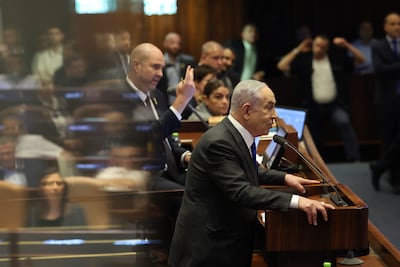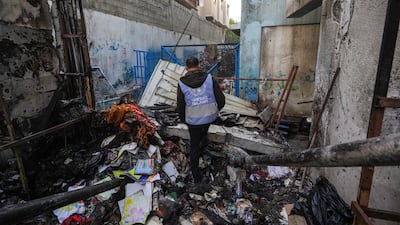Live updates: Follow the latest on Israel-Gaza
Israel’s parliament has overwhelmingly approved the first reading of three bills to sever all relations with UNRWA, the UN agency responsible for providing vital services for Palestinian refugees across the Middle East.
The bills seek to ban UNRWA from operating in Israel, strip its employees of the diplomatic privileges and immunity accorded to UN staff, and to label the agency a terrorist organisation.
Juliette Touma, UNRWA's director of communications, said the proposals were “another attempt in a wider campaign to dismantle the agency” and that “ongoing similar attempts continue on different levels”.
“Nothing similar has ever happened in the history of the UN,” she told The National.

The organisation has long been under attack in Israel, facing accusations that it tolerates anti-Semitic content in the curriculum of the schools that it operates; that it is closely linked to Hamas; and that it perpetuates the refugee status of Palestinians, which many Israelis say makes ending the Israel-Palestine conflict more difficult.
After the deadly October 7 attack on Israel by Hamas, the steady stream of criticism from most sections of the Israeli political spectrum has turned into tsunami of hostility that has also been directed at other UN agencies, NGOs and humanitarian agencies working with Palestinians, particularly in Gaza.
Israel in January accused 12 UNRWA staff of participating in the October 7 killings, and in March and April another seven. One of the cases has been closed by UN investigators and another three suspended for lack of evidence.
Israel's army has said it uncovered Hamas weapons and tunnel entrances at a number of UNRWA facilities, including schools.
In a statement on its website, UNRWA has responded to these accusations saying: "Since the mid-2000s, during conflicts in Gaza, there have been instances when armed actors from both sides have violated the neutrality of UNRWA sites, which are protected by international law.
"They have, for example, entered UNRWA buildings or used them for military purposes. UNRWA has systematically condemned such violations of UN premises."
The accusations against UNRWA employees nonetheless prompted many western countries to suspend donations to the agency at a time when Israel's military retaliation had made its services in Gaza more crucial, although many states have since resumed funding.
The passage of the three parliamentary bills would almost certainly lead to the closure of UNRWA’s West Bank field office in East Jerusalem, which has faced a series of violent attacks by Israelis in recent months.
But the main impact would be financial, particularly in terms of banking, humanitarian sources say.
A terrorist designation would prevent UNRWA from using Israeli banks to transfer funds into Gaza and the West Bank, by far the simplest means of getting money to the agency's many projects.
Any international bank that works with UNRWA would also be at risk of being barred from access to the entire state of Israel for co-operating with a terrorist organisation, a significant deterrent.
The same would apply to relief organisations associated with states friendly to Israel, who might prefer not to interact with an organisation that an ally deems a terrorist outfit.
UNRWA’s vast logistical programme for getting aid into Gaza would also be affected if it was banned from working in Israeli territory, because a critical portion of aid to the strip passes through crossings in Israel.
There is the option bringing in supplies through Egypt, but for now this would be a problem as the Israeli military controls the south of the strip, including the Rafah border crossing with Egypt.

The terror designation would also affect UNRWA’s wide network of partner NGOs and humanitarian organisations in Gaza and the West Bank, all of whom rely on the organisation for, among other things, logistical help, fuel and warehouse storage.
More widely, such a direct attack on a UN agency by Israel would be seen by many as an attack on the entire international body.
While numerous sources believe the passage of the bills against UNRWA is inevitable, the extent to which Israel will act upon them is uncertain.
Israel has in the past designated Palestinian NGOs in a similar manner and yet did not take the most extreme steps open to it, such as seizing their bank accounts.
Israel could also face international pressure, including from close allies, which might moderate its response once the designation has been made.


